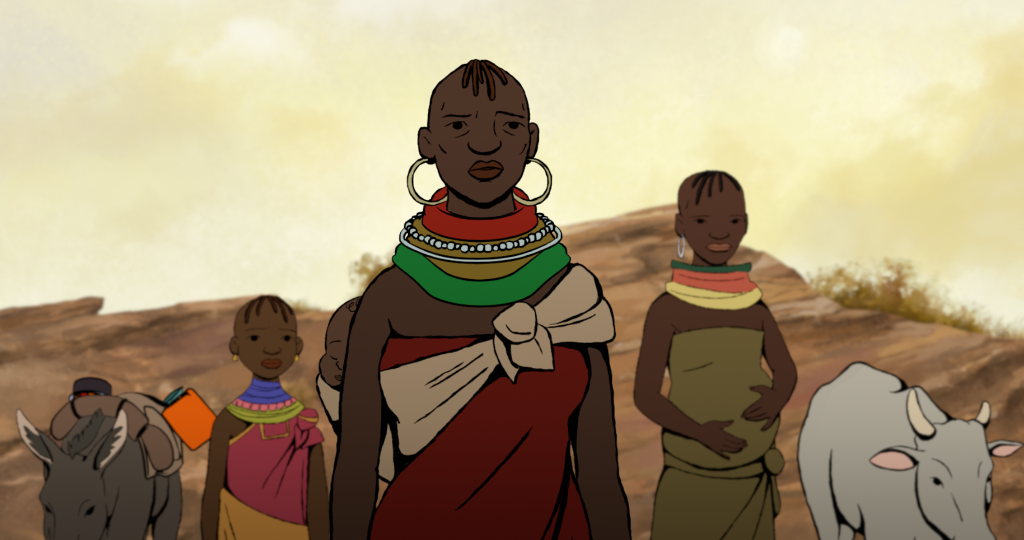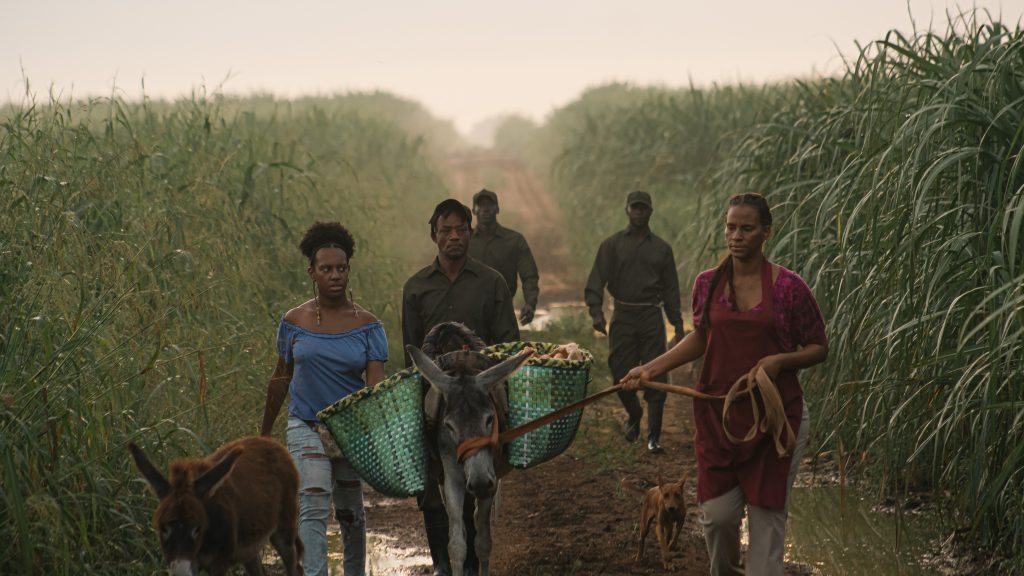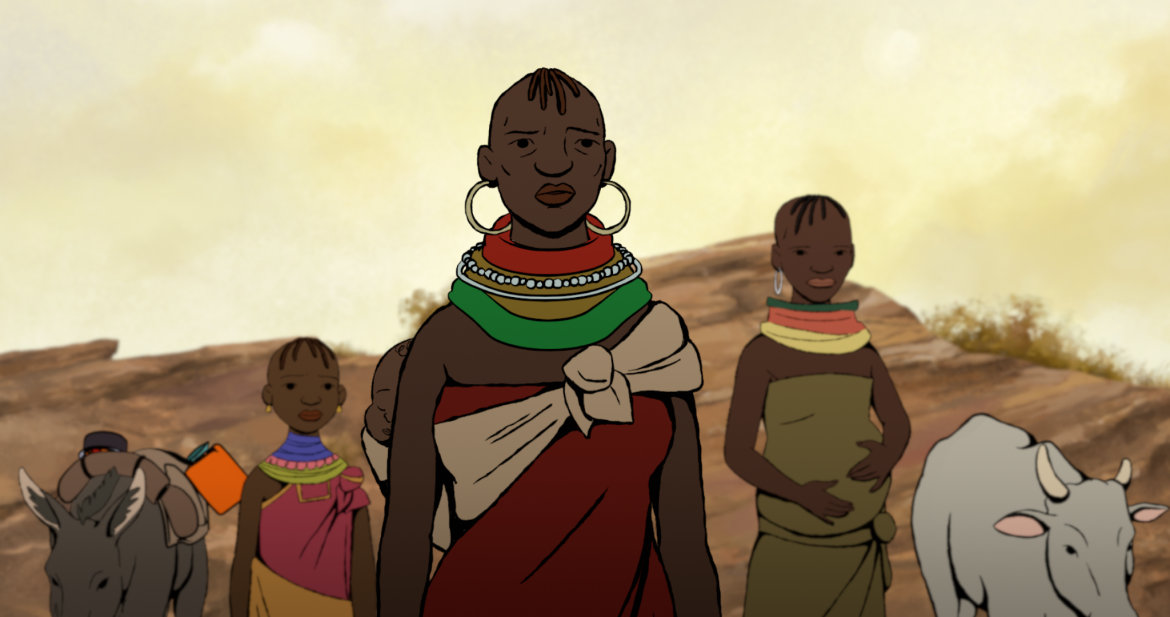• This Friday, April 25, the section dedicated to Canarian cinema will screen the celebrated Mariposas negras, by David Baute, and the magnetic Sugar Island, directed by Johanné Gómez Terrero and produced by Tinglado Films with Baute at the helm
Las Palmas de Gran Canaria, Wednesday, April 23, 2025.- Leaving one’s territory to hold onto a new survival. Or rather staying inside known borders that everybody wants to leave behind. The two feature films opening the Canarias Cinema competitive section approach the contemporary conflicts global women have to go through, sprung far from the First World, and in their role as breadwinners. Mariposas negras / Black Butterflies has already captivated critics and audiences alike, an auteur piece by Tenerife native David Baute: an animated portrayal of climate migration that is as tender as harsh. Sugar Island is a work by Dominican Johanné Gómez Terrero: a window to her island’s mythical universe from the point of view of a teenager on the edge. Both titles will be screened this Friday, April 25, during the first day of the Las Palmas de Gran Canaria International Film Festival.
Mariposas negras / Black Butterflies (2024, Spain-Panama, 83 min.) is scheduled at 10 a.m. at Cine Yelmo Las Arenas Screen 6 and at 8 p.m. at the same screen. David Baute will attend its last screening a few days later, on April 29, that will take place at 6 p.m. at Cine Yelmo Las Arenas Screen 7.
Sugar Island will be shown on Friday, too, at Cine Yelmo Las Arenas Screen 6, first at 12:15 p.m. and then at 6 p.m. Its last screening is scheduled for May 1 at 8 p.m. at Screen 4.
Mariposas negras / Black Butterflies

David Baute made the celebrated Climate Exodus (2020) before moving on to his animated butterflies. That piece won the Green Spike at the 2021 Valladolid International Film Festival, and had a significant run at festivals: a documentary in line with its filmmaker’s commitment and interest in delving into the humanity behind migratory processes that has ended up becoming the spark for his last feature film.
Because that’s just what Mariposas negras addresses: the geographical and personal odyssey of three women affected by climate unrest in different parts of the planet. Kenya, India and the island of San Martín, in the Caribbean, are the birthplaces of the three protagonists, whose dramatic story bluntly lays on the table their families’ condition of climate refugees. This label is disdained in their new destinations in the First World, where these three modern heroines’ gazes accompany their children’s perceptions of the new universe that is opening before them.
Mariposas negras won Best Animated Film at the last Goya Awards. It also obtained the Gaudí Award, in addition to earning nominations at prominent festivals such as Sitges.
Yaiza Berrocal’s screenplay, María Pulido’s cinematography and Diego Navarro’s music have contributed to the final version of this feature, directed with sensitivity and a steady hand by Baute. The film is produced by Ikiru Films (with Edmon Roch’s involvement), Tinglado Films (the director’s company), Anangu Grup and the Catalan company Mitjans Audiovisuals, in co-production with Tunche Films, from Panama, and with the participation of Mogambo, RTVE, 3CAT and Radio Televisión Canaria.
The support the production has received reflects its decade-long preparation, both in regards to finding real stories as well as adapting them to the screen. The story was turned into animation, in a vague style half way between documentary and fiction, that ended up being extremely effective in completing the protagonists’ adventures and in broadening the audience’s interest in the work.
Pepe Sánchez’s work as director of animation, as well as the involvement of Panamanian producer César Celada, were essential to the completion of this piece, whose own simple and direct style makes it capable of evoking the initial reality with a critically endorsed appeal.
Through their work, Baute and Roch have transcended the very boundaries of cinema. They both presented Mariposas negras at the United Nations headquarters in New York, at the invitation of UNHCR. The film’s subsequent selections at the Annecy Film Festival or the Amsterdam International Documentary Film Festival endorse this way of telling truths and its ability to convey them to the audience.
Sugar Island

David Baute and his production company, Tinglado Films, had a key role, too, in the creation of the second feature film screening as part of Canarias Cinema on April 25. Sugar Island (2024, Dominican Republic-Spain, 90 min.) has a Canarian stamp, in addition to the Caribbean one its filmmaker Johanné Gómez Terrero brought with her.
The director made her debut with Bajo las carpas, where she depicted the life in Port-au-Prince after the 2010 earthquake. She later explored Santo Domingo’s marginalization in her Caribbean Fantasy (2016). And now she has approached in her sugar island the reality of a pregnant teenager living between sugar canes and a desire to flee to the North. Its main character, Makenya, played by Yelidá Díaz, ends up discovering the magical and mystical background that still survives in Creole culture while facing at the same time her own drama.
Johanné Gómez Terrero is also a teacher and activist. Trained at Cuba’s San Antonio de los Baños International Film and Television School, as well as at Cataluña’s Film and Audiovisual School, her pieces connect with a very island reality, which is emotionally tied to the Canary Islands, too. In Sugar Island she depicts the exploitation in the sugar cane industry, economic colonialism and the Afro-Caribbean community’s struggles. And she manages to do it in a straightforward and conscientious manner.
The screenplay, co-written between Gómez Terrero herself and filmmaker María Abenia, sustains a film that captures the audience’s attention thanks to its textures and the power of its colors and setting. Something that speaks of the quality of Chilean cinematographer Alván Prado’s work, who won this category at the last Málaga Film Festival. Jonay Armas’ score finishes shaping the film’s humid and hot atmospheres, which prove all-enveloping in their visual development.
Sugar Island is true because it began as a documentary, although it turned out to be a more than convincing fiction. Years ago, in fact, this Dominican director’s project appeared under its original documentary format at MiradasDoc. Its transformation to a more conventional feature film has given it a prominent presence in theaters and festivals.
Nominated for Best Feature Film in Malaga, its Canarias Cinema selection is an example of the quality of the pieces competing for the 2025 Richard Leacock Award. But beyond the spaces where it’s been shown, Gómez Terrero’s Sugar Island uncovers realities of global foundations and scope.
The Las Palmas de Gran Canaria International Film Festival, organized by the Culture area of the Gran-Canarian capital’s City Council through Promoción de la Ciudad de Las Palmas de Gran Canaria, has received public assistance by the ICAA [Institute of Cinematography and Audiovisual Arts], the Visitors’ Program for the Internationalization of Spanish Culture (PICE), of the Spanish Public Agency for Cultural Action (AC/E), as well as public support from Promotur Turismo Islas Canarias.
Among the Festival’s collaborators we may find Fundación Auditorio Teatro, Cines Yelmo, Las Arenas Shopping Center and Hotel Cristina by Tigotan, places which also function as venues or hold activities of the film event; as well as other institutions and companies such as Sagulpa, Toyota, Royal Bliss, Fuze Tea, Coca Cola, Sholeo Lodge, Audiovisuales Canarias, Music Library &SFX, Blackout Films and International Bach Festival. Likewise, its market, MECAS, has been possible thanks to the sponsorship of the Gran Canaria Film Commission-Sociedad de Promoción Económica de Gran Canaria and the support of Proexca.
The University of Las Palmas de Gran Canaria, the Mid Atlantic University, Digital 104, the Audiovisual Cluster of the Canary Islands, the Association of Women Filmmakers and Audiovisual Media CIMA, the Cartagena International Film Festival, the Gijón International Film Festival, the Barcelona Independent Film Festival, the Tres Puertos Laboratory, Barcelona’s ESCAC, and Very Good Script, Freak World and Fimucité are also collaborators.
Share this Post

